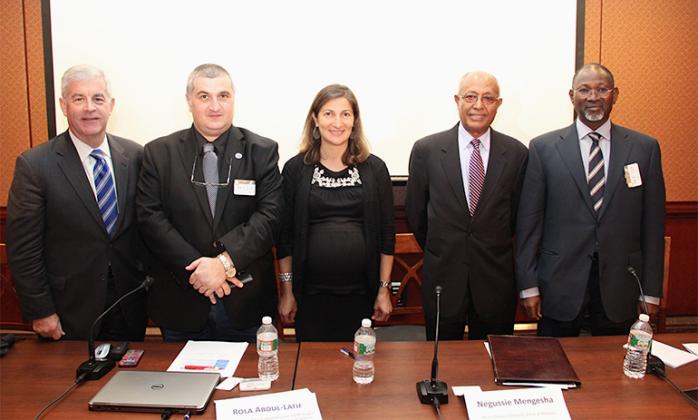
Assessing Nigeria’s Historic 2015 Elections
On October 1, 2015 the International Foundation for Electoral Systems (IFES) hosted “Assessing Nigeria’s Historic 2015 Elections” on Capitol Hill, a discussion of Nigeria’s recent general elections and presentation of IFES’ post-election public opinion survey featuring the former Chairman of Nigeria’s Independent National Electoral Commission (INEC), Professor Attahiru Jega. Bill Sweeney, President and CEO of IFES, provided opening remarks on the significance of this year’s elections, which led to the first democratic transfer of power in Nigeria’s history. He spoke of how it ensured that citizens’ “voices are heard through the ballot, not the bullet,” and how the data IFES gathered can be used to help in planning the next election.
Event moderator Negussie Mengesha, Africa Division Director for Voice of America, then introduced panelists Shalva Kipshidze, IFES Nigeria Chief of Party; Rola Abdul-Latif, IFES Senior Research Evaluation and Learning Manager; and Professor Attahiru Jega, who was recently presented with IFES’ 2015 Charles T. Manatt Democracy Award for his leadership and management of the 2015 elections.
Kipshidze provided an overview of IFES’ work in Nigeria since 1988, which has received generous support from the U.S. Agency for International Development (USAID) and the UK Department for International Development (DFID). In the months leading up to the 2015 general elections, IFES’ programming included training for INEC staff members and 774 local election officers; the roll-out of a cascaded training of trainers; hiring and embedding a graphic design adviser for designing ballot papers in-house; working with civil society organizations to monitor campaign finance; and conducting pre- and post-election surveys.
Abdul-Latif has worked on a number of such surveys and research projects and presented the audience with findings from IFES’ post-election survey, which was conducted from July 26 through August 7, 2015. Overall, Nigerians’ satisfaction with democracy has more than doubled in the months since the December 2014 pre-election survey, and nearly three-quarters of Nigerians believe that both the integrity and organization of the 2015 general elections was better than in the previous polls in 2011. Knowledge of and confidence in the INEC improved dramatically between a pre-election survey that was conducted before the general elections and the post-election survey.
Professor Jega then spoke of his last five years with the INEC, “the only [Nigerian] commission to have conducted two elections.” Challenges included the politicization of ethnicity and religion, as well as the perception that the INEC had “only delivered results for the highest bidder.” While they had had less than a year to prepare for the 2011 general elections, they then had four years to strategize for the 2015 general elections and “make INEC one of the most effective and efficient election management bodies in the world.” Looking forward, he sees a need for the INEC to strengthen the partnerships and institutions formed in this cycle “so that developments are not easily reversed” in future elections.
An audience question and answer session followed Jega’s remarks and featured questions about lessons learned from the 2015 general elections; security risks surrounding the elections and the resulting six-week postponement; and the costs of conducting the elections, which Jega found to be slightly lower per voter in Nigeria than the average across Africa.
After a query from Mengesha as to why he stepped down from the INEC and has since returned to academia, Jega responded that he hopes to “encourage young people for patriotic service” through his new position. In closing the discussion, Sweeney congratulated Nigeria on its Independence Day and encouraged everyone to similarly look toward the future, as “no election is perfect” and the challenge of democracy continues.









